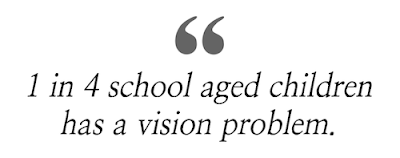It’s Vision Health Month. Get Wise About Your Eyes.
Friday, May 10, 2019
Disclosure: I have partnered with YMC and Loblaw, and have received compensation for this post. All opinions are my own.
Earlier this year, I turned 41 years old. Forty-one, people! While my brain knows that I am far from being old, my body seems eager to prove the opposite. My knees are aching, my memory is not what it used to be and my hair has begun to turn grey. And get this: my Optometrist informed me that I'll soon be needing bifocals! I think I'll hold off on those for at least another decade, mkay? In the meantime, I'll be keeping up with my eye exams, which I schedule regularly every two years, to make sure that my eyes are otherwise healthy and to keep up with any changes to my current prescription. You see, I've worn glasses nearly my entire life, so when it comes to vision health, I mean business.
I was in first grade when my school teacher noticed me squinting while trying to read the blackboard. I thought nothing of it because I was sitting in the back row and just assumed it was blurry for everyone else sitting in my row. She recommended to my parents that I see an Optometrist and sure enough, I was myopic (or nearsighted). A few weeks later, when I tried on my first pair of glasses, it was as though a whole new world had opened up. That was the day when I told myself that I would never take near perfect vision for granted ever again.
Once I became a parent, I secretly hoped that my kids had inherited their dad's eyes. Not only are his eyes just plain beautiful, he's never needed glasses and neither have any of his siblings. While I was always pretty vigilant when my kids were little, I did not hesitate for a second when their pediatrician suggested that I take them to see a licensed Optometrist before they even turned a year old. It gave me peace of mind knowing that they didn't have any vision problems that could potentially contribute to developmental and learning issues during those crucial years. Plus, vision changes can occur without parents or children even noticing. However, there are some signs of vision changes in children to watch for:
Fast forward to today and I now have my eldest child who requires glasses for reading. And I never would have known if it weren't for regular eye exams. So how frequently do we need to see the Optometrist? It all depends on your age. The Canadian Association of Optometrists (CAO) developed the following evidence-based guidelines for the recommended frequency of eye exams:
- Infants and Toddlers (Birth to 24 months) - First eye examination between the ages of 6 and 9 months
- Preschool Children (2 to 5 years) - At least one eye examination between the ages of 2 and 5 years
- School Age Children (6 to 19 years) - Annually
- Adults (20 to 39 years) - Every two to three years
- Adults (40 to 64 years) - Every two years
- Adults (65 years or older) - Annually
Now that both my daughter and I wear glasses, we have a lot of fun shopping for frames and checking out the latest styles at the on-site Theodore & Pringle Optical while the boys go grocery shopping at Loblaws. You can even schedule an appointment to get your eyes examined, too! I'm due for a new pair of eyeglasses so I recently popped by Theodore & Pringle and was blown away by their impressive collection of frames.
I narrowed down my choices to these three classic frames but was torn between a pair of Kate Spade or Joe Fresh frames.
I have only worn frames that have nose pads (yes, nose pads!) because I find them to be more comfortable than those that don't. So as much as the Joe Fresh frames looked oh, so cute, I am leaning more towards these Kate Spade frames with a subtle yet sleek gold trim.
Given that May is Vision Health Month, I want to take the time to encourage you to "priorit-eyes" your eyes and book an exam with your Optometrist. We know eye health and vision care are important. But do we know why?
Through an eye exam, an Optometrist can uncover underlying health conditions, such as the early warning signs of conditions such as hypertension, high cholesterol, vascular disease, thyroid disease, brain tumors and diabetes. Optometrists can also detect common causes of serious vision loss that often occur later in life, including cataracts, age-related macular degeneration (AMD), glaucoma, or diabetic retinopathy.

































4 COMMENTS
These tips are so important for families.
ReplyDeleteThank you for the valuable tips
ReplyDeleteI need to check my vision, Theodore & Pringle Optical is nice place to visit!
ReplyDeleteI have to admit that I neglected to take my kids to the optometrist on a regular basis despite there being a strong history of eye issues on both sides. And, guess what, 2 of 4 needed glasses. Get your eyes checked!
ReplyDeleteThanks for taking the time to leave a comment here on Toronto Teacher Mom. Hope you have a great day!